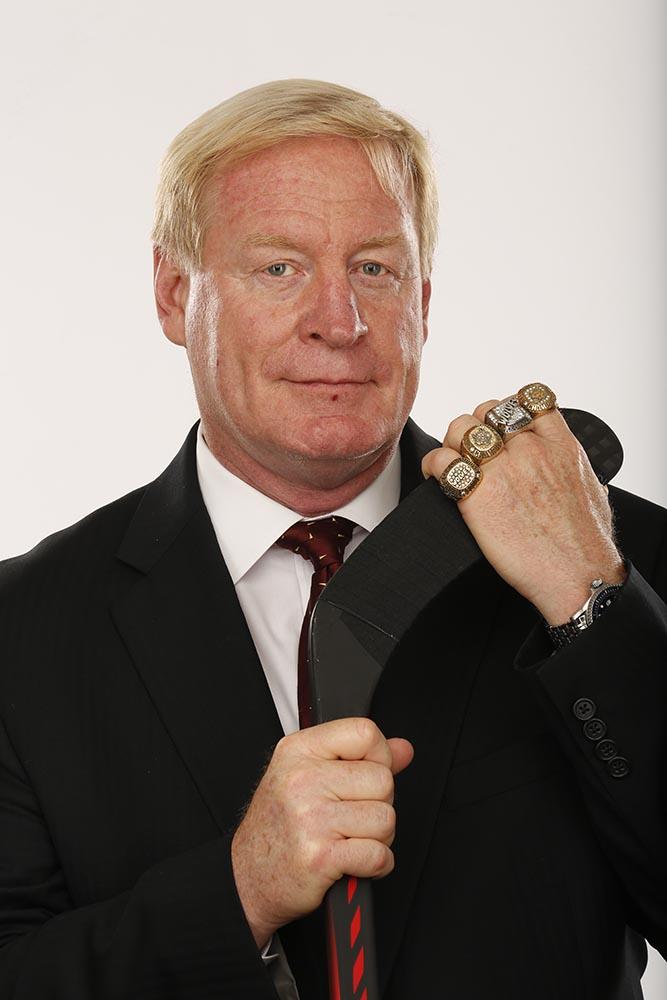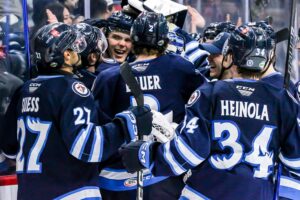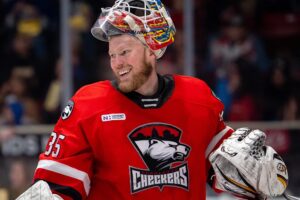by Kristen Shilton || AHL On The Beat Archive
Turns out, you can go home again.
And, if you’re really lucky, it’ll look even better than it did when you left. Just ask returning Chicago Wolves head coach John Anderson.
“It feels like I never left. All the people here are the same and they’re still great,” he said. “The rooms are painted a lot nicer. But other than that, it’s the same. It’s exciting to be back.”
For a guy who won four championships with the Wolves during his first coaching stint, from 1997-2008, excitement is all relative. Hailing from Toronto and drafted 11th overall by the National Hockey League’s Toronto Maple Leafs in 1977, Anderson switched over to coaching after a 20-year playing career and was the Wolves’ bench boss when they were the International Hockey League’s Turner Cup champions in 1998 and 2000 and the American Hockey League’s Calder Cup champs in 2002 and 2008.
After leading the organization to its last title, Anderson took over as head coach with the NHL’s Atlanta Thrashers, who were the Wolves’ affiliate from 2001-11. He spent two years in Atlanta and later two more as an assistant coach with the Phoenix Coyotes.
The whole experience taught Anderson a lot about what it takes to succeed in this business –- and how the Wolves’ dynamic helped propel them to so much success.
“In Atlanta, I found you can’t win without the horses,” he said. “You think you can fix everything, especially when you come off a championship season. But you find out there are a lot of other roadblocks out there that inhibit you from doing what you want to do. Unless your whole management is on the same page as you, you’re tugging against each other all the time.
“With the Wolves, we had our disagreements but we were all on the same page. We all knew we wanted to win first and foremost. That’s the way it needs to be.”
Now that Anderson is back in the fold, he’s once again pondering the horses, namely the ones he met for the first time this season. The Wolves parted ways with the NHL’s Vancouver Canucks in April and entered into a partnership with the St. Louis Blues, meaning Anderson isn’t the only one getting his feet underneath him early on.
“There was a little apprehension for me because I didn’t know all of the players, so it’s taking some time to get used to,” he said. “We’re doing some things a lot of these players have never seen before and even our coaches are going to be doing different stuff and it’s going to take some time to get going. I’m a little concerned about that.”
Fortunately for Anderson, he has a familiar crew in his corner to help in the transition. Once a player (from 1998-2001) and coach (from 2004-08) under Anderson, general manager Wendell Young is now in the position Kevin Chevaldayoff held all the years Anderson was previously manning the Wolves bench. Although the situation is a little different, the personalities remain the same.
“Nothing has changed between us. He’s the same old Johnny and I’m the same old Wendell,” Young said. “We’re a little more in-depth in our conversations and we talk a lot more about the players, but the biggest thing about our organization is we’re all in it together and that’s something that we have always prided ourselves on.”
When Chevaldayoff was in Young’s seat, he and Anderson together faced down the Wolves’ shift from an IHL to an AHL franchise in 2001. Working with a new affiliate and balancing their needs with another team’s required a certain learning curve, so Anderson was prepared for what he and Young were stepping into now.
“It’s a different dynamic than it was before. We’re with a different team now,” Anderson said. “With Atlanta, they weren’t difficult to work with, but their expectations of the players they drafted weren’t realistic. For Chevy and I to try to convey that without hurting their feelings, that was the biggest problem.
“When I was first with Chevy I didn’t know him at all. I played against him. With Wendell we’ve known each other for years. I know his thought process. I coached with him and now he’s my boss, of course, but he knows that thought process I have and he’s committed to it the same way.”
After two seasons of being an assistant in Phoenix, getting back into a role where he could call the shots is a big part of what brought Anderson back to Chicago. Not to mention the fact he never really cut ties with the area.
“I wanted to be a head coach again and there are only 30 jobs in the NHL to do that,” he said. “If I was going to be a head coach in the American League or the Kontinental Hockey League, this is where it should be. It just so happens that I still have a house here and my kids just bought houses here. When [Wolves owner] Don (Levin) asked me if I was interested I told him, ‘Absolutely.’ It was an easy decision for me, a no-brainer.”
And while for many the NHL’s lockout last season was a hindrance, it turned out to be a blessing in disguise for Anderson, who got a much-needed refresher on who’s who in the AHL.
“I scouted the Wolves last year during the lockout. I did the Wolves, Rockford and Milwaukee,” he said. “I had an idea of what the American League was like. It doesn’t take long not to know this league, with a whole new crop of players coming in all the time. I was only away for five seasons and it doesn’t seem that long, but that’s a lot of new players coming through organizations.”
He may have left Chicago behind, but the winningest coach in the Wolves’ history (506 victories in 808 regular-season games, plus 105 postseason wins) always kept one eye trained on his former club and kept track of its progress. Their level of success, though, has paled in comparison to when he was in charge. Anderson has a good idea of how to get them back on top.
“The Wolves had good players in the last few years, but I think they were lacking a depth of good players,” Anderson said. “During the championship years we had three lines you were afraid to be out against and that’s kind of the thought process we took this year. We want to have more depth on the team. If we lose one big scorer we need to have another player to pick up the slack and it’s not all based on him. We want our young guys to know what it’s like to play for a championship team and to know they can be really successful.”
Beyond just keeping tabs on the Wolves for professional reasons, the bonds Anderson built over the years with Levin, Young, senior advisor Gene Ubriaco and vice chairman Buddy Meyers remained a priority on both sides.
“I stayed abreast with how the Wolves were doing because my friends were running the show and I wanted them to do well,” he said. “I talked to them at least once a month wherever I was. In fact, I lived right across from Don’s mother-in-law in Phoenix. Gene and I talked at least once a week. So we’ve stayed close and stayed in touch. When you spend 11 years with people, you’re going to maintain those relationships.”
While some might say the group’s history of success is a good indicator of what’s to come over the next couple years, Anderson doesn’t dwell on what was. He acknowledges his return puts pressure on him and the rest of the Wolves hockey operations staff, but maintains no one is as hard on him as he is on himself.
“I think expectations change over time. When we first got going as a team, no one was really known. No one knew us,” he said. “There was a lot of apprehension and when I started, I was more focused on bringing a new thought to the team and it took a long time to see it all pan out. During the first championship season it took us until about January to really start clicking. But then there’s an expectation you’ll be that caliber of team immediately next season. Regardless, I feel pressure everywhere. I take that upon myself. Mediocrity kills everybody. We don’t want to be mediocre. We want to win championships.”
Which is exactly why Young and Levin came to the conclusion early on of whom they wanted to fill their vacant head-coaching job. Their confidence in what Anderson is capable of doing for the Wolves was unmatched.
“The main factor in our decision was, first and foremost, we had 11 successful years when Johnny was our coach and he’s the only person who has won championships here,” Young said. “We wanted him and just him. There truly was no coaching search, there was just a mutual agreement that he should come back because he knows what we want to do and he can get it done.”
Those four Cups the team won remain Anderson’s best memories of being in Chicago, but he says the fans provided other memorable moments. He remains fueled by a desire to bring players and fans together.
“We’ve had a lot of fun over the years at the Booster Club dinners and events like that. I performed a couple times and did some other stupid things. I sang one year,” he said. “Again, we want to create that togetherness, not just with our team but with the fans. And that all comes with winning. You don’t get to stay around and have a lot of accolades if you don’t win. That’s first and foremost.”
In order to help the Wolves get back on track, Anderson is going to play to his strengths. His reputation is as an offensive-minded coach, but he’s quick to point out it’s for good reason -– and doesn’t detract from the other elements of the game that support it.
“I am offense-focused because I know the one who scores the most goals wins,” he said. “My thought is, ‘When you have the puck, go forward with it.’ And not just with three forwards, but with all five guys on the ice. Time in the zone is really important and it wears other teams down and doesn’t give the other team’s offense time to get going. Plus I know it’s really hard for other teams to score when the puck is in their zone.
“People don’t think I’m a defensive coach but when we don’t have the puck, everyone has assignments. It’s not like I go, ‘Never mind.’ But with that, our goaltending has to be solid. I have a lot of confidence in Matt Climie and I’ve seen Jake Allen play and he’s solid. If we get really good goaltending, we have a shot.”
That’s what the Wolves are looking for most, after failing to make the playoffs three of the last five seasons without Anderson. As the new old head coach gets ready to try and bring the good ol’ days back to Wolves hockey, he’s reminded of the time 16 years ago he first imagined what it would be like winning a championship with this team, and how it has defined his philosophy now.
“I remember when I was first (interviewing for the) job, assistant general manager Bill Bentley was showing me around the arena and it didn’t look as big as it is and I thought, ‘I wonder what it would be like to coach here when it’s packed and it really means something’ and I hadn’t even gotten the job yet. But I got to see what that was like and it was awesome.
“You’re allowed to win every game. You’re allowed to win every championship. It’s in the rulebook. People who say, ‘That’s not possible,’ you have to say to them, ‘Yes, it is’ and then show them how you’re going to go about it. You have to keep that in the back of your mind and make that your mentality all the time.”






































